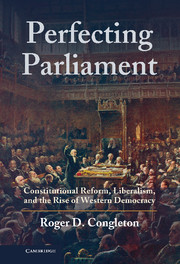Preface
Published online by Cambridge University Press: 05 June 2012
Summary
Preface
Two political revolutions occurred gradually in northern Europe during the nineteenth and early twentieth centuries. First, political authority shifted from kings to parliaments. Second, parliaments became more broadly grounded in popular suffrage. This century-long shift in political authority was a major event, although the individual shifts of power and expansions of suffrage were often relatively small events. Nor were these two shifts of policy-making power entirely connected. European parliaments had occasionally gained power in previous periods without broadening their electoral bases, which before 1800 were generally limited to well-organized and well-born elites. In some cases, suffrage expanded more rapidly than power shifted to the parliament, as in Germany, whereas in other cases, such as England, parliament became the dominant institution for public policy making well before universal suffrage was obtained. Yet by the 1920s, the new democratic parliamentary governments were broadly similar throughout Europe and were radically different from previous governments that Europe and the world had experienced during recorded history. These new parliamentary governments were revolutionary, although not products of war or sudden breaks with the past. Something evidently had happened during the nineteenth-century in Europe that gave rise to gradual but extraordinary changes in governance in the course of only a century or so.
It has often been suggested that industrialization played a role in these constitutional reforms. To the best of my knowledge, however, no one has provided a peaceful mechanism through which industrialization – itself largely an economic activity – may induce major political reforms. Whether economic development induces constitutional reform or constitutional reform induces industrialization is not obvious. After all, it is political decisions that determine contract, property, and tax laws, and it is political decisions that largely determine how those rights and obligations will be enforced. Economics suggests that such political decisions can have large effects on a nation’s path of economic development by affecting transaction costs, technological innovation, and market size. One could argue that national governance largely determines market activity, even in a fairly complete model of political economy.
- Type
- Chapter
- Information
- Perfecting ParliamentConstitutional Reform, Liberalism, and the Rise of Western Democracy, pp. ix - xPublisher: Cambridge University PressPrint publication year: 2010

